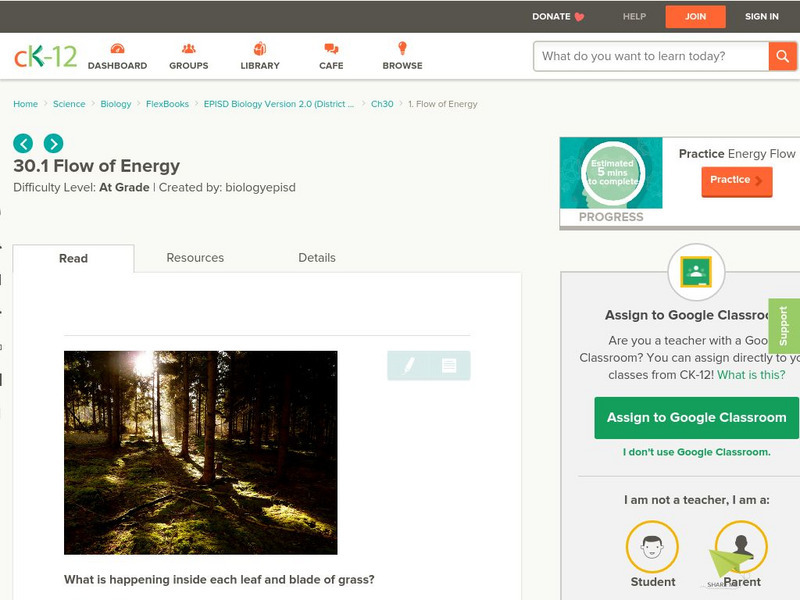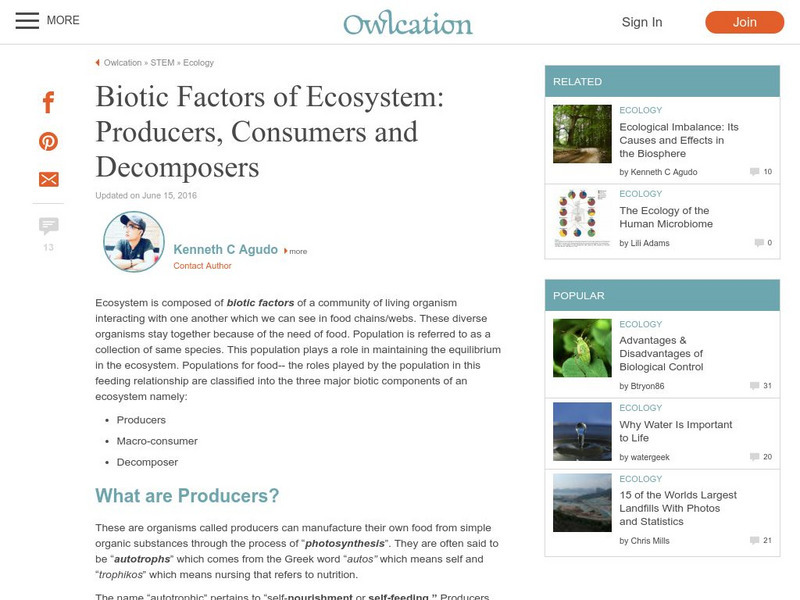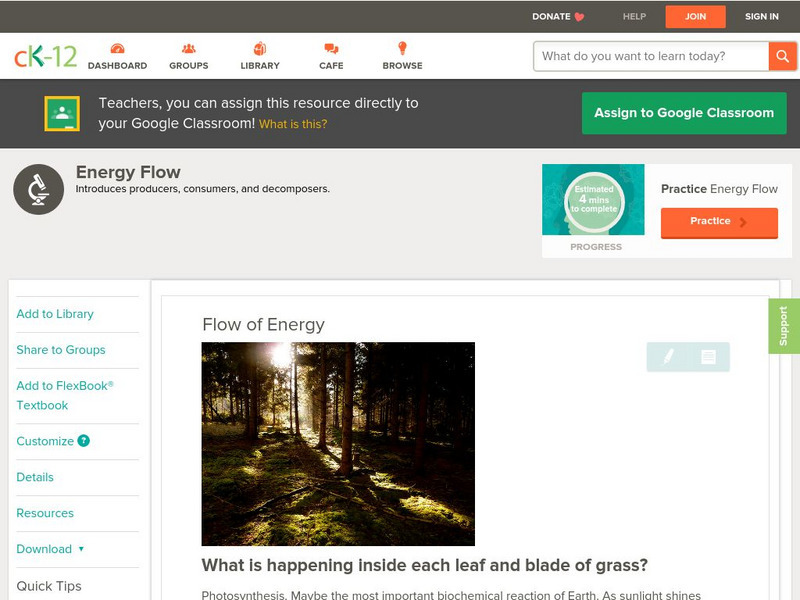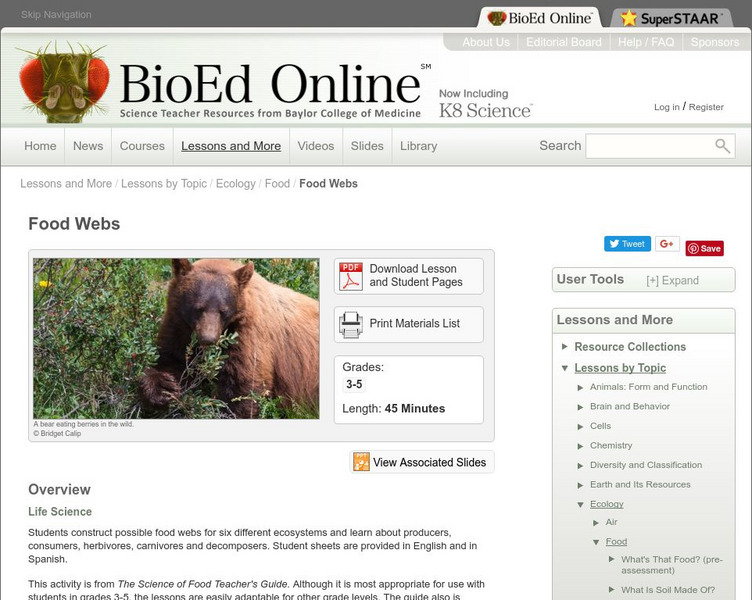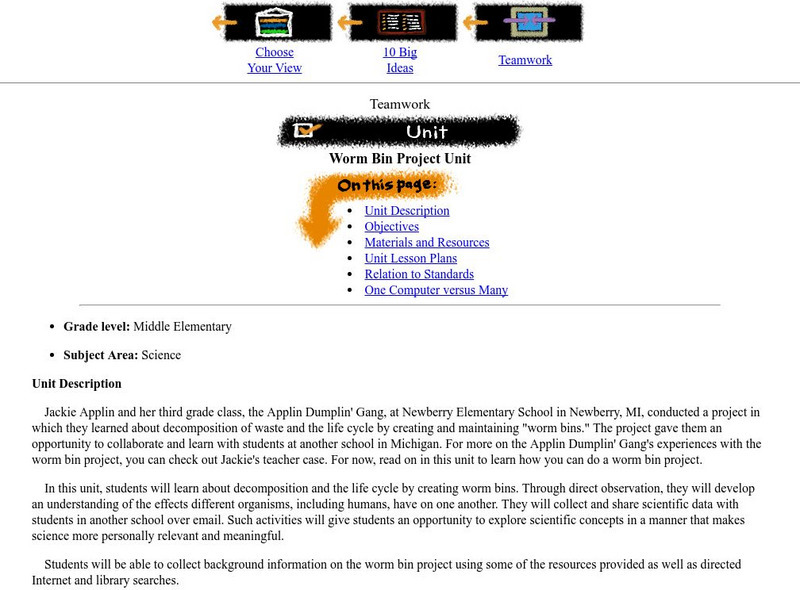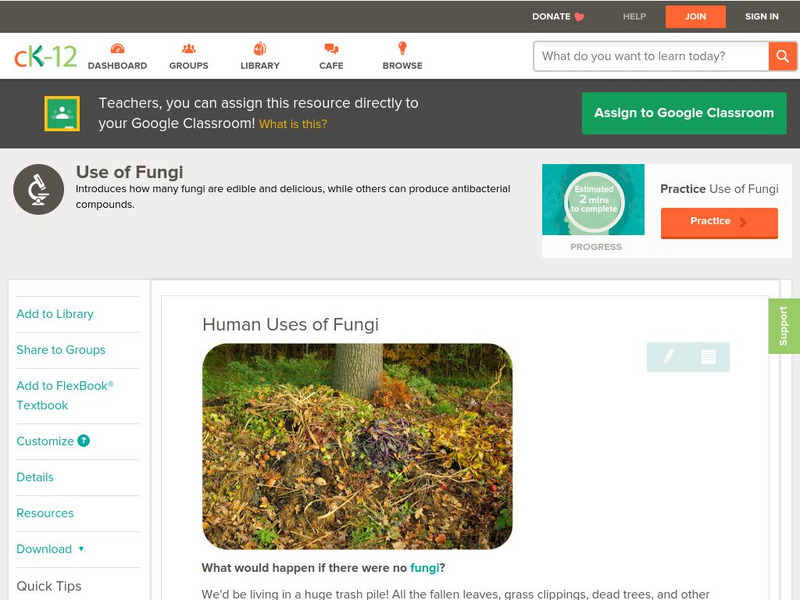National Geographic
National Geographic: Coral Reef Food Web
Explore the food web in a coral reef with these illustration. Identify the consumers, producers, and decomposers that are located within this ecosystem. Site includes illustration exploring the different food chains as well as questions...
Planet Pals
Planet Pals: The Food Chain
Omnivores, herbivores and carnivores are waiting for you. The food chain comes to life at this friendly site.
CK-12 Foundation
Ck 12: Episd Biology: Flow of Energy
[Free Registration/Login may be required to access all resource tools.] Students will study how energy flows through an ecosystem and learn about photoautotrophs and chemoautotrophs, the role of decomposers, and of consumers.
BBC
Bbc: Gcse Bitesize: Material Cycling in Ecosystems
This lesson focuses on the carbon cycle which shows how atoms of carbon can exist within different compounds at different times and be recycled between living organisms and the environment. It also provides a link to an assessment.
Other
Hub Pages: Biotic Factors of Ecosystem: Producers, Consumers and Decomposers
An ecosystem is composed of biotic factors of a community of living organisms interacting with one another which we can see in food chains/webs. These diverse organisms stay together because of the need of food. Population is referred to...
Science Education Resource Center at Carleton College
Serc: Mn Step: The Flow of Energy: Balancing Ecosystems
A lesson outlining activities for a science unit where students can learn about the relationships and the flow of energy within an ecosystem. These include predator and prey, hosts and parasites, and consumers, producers, and decomposers.
CK-12 Foundation
Ck 12: Biology: Flow of Energy
[Free Registration/Login may be required to access all resource tools.] Describes how energy flows through an ecosystem.
SMART Technologies
Smart: Ecosystem Food Chain and Food Web
Starts with living and non living and works through producers, consumers, food chains and food webs.
TeachEngineering
Teach Engineering: Biodomes
Students explore the biosphere's environments and ecosystems, learning along the way about the plants, animals, resources and natural cycles of our planet. Over the course of lessons 2-6, students use their growing understanding of...
TeachEngineering
Teach Engineering: Got Energy? Spinning a Food Web
Students learn about energy flow in food webs, including the roles of the sun, producers, consumers and decomposers in the energy cycle. They model a food web and create diagrams of food webs using their own drawings and/or images from...
BioEd Online
Bio Ed Online: Food Webs
Students construct possible food webs for six different ecosystems as they learn about the roles of producers, consumers, herbivores, carnivores and decomposers.
Discovery Education
Discovery Education: The Dirt on Soil
This interactive website explores the various soil layers and introduces you to the lifeforms that live in those soil layers.
TeachEngineering
Teach Engineering: Go With the Energy Flow
Students learn about energy and nutrient flow in various biosphere climates and environments. They learn about herbivores, carnivores, omnivores, food chains and food webs, seeing the interdependence between producers, consumers and...
Michigan State University
Michigan State University: Lets Net: Worm Bin Project Unit
Learners learn about the worm life cycle and decomposition of life by creating small-scale worm ecosystems. Research groups share scientific data with groups at other schools using web-based communication tools.
ClassFlow
Class Flow: Energy in the Ecosystem
[Free Registration/Login Required] This flipchart focuses on how plants and animals get energy and different habitats.
Other
My Science Box: Food Chains
Students will use a card sorting activity to construct a food chain and identify the role of organisms within that chain. The cards represent different individuals in an ecosystem and will help students begin to understand the concepts...
CK-12 Foundation
Ck 12: Life Science: Human Uses of Fungi
[Free Registration/Login may be required to access all resource tools.] Fungi are extremely important to the ecosystem because they are one of the major decomposers of organic material. But how do they help people? They are used to help...
Sophia Learning
Sophia: Living Organisms and Their Environment: Lesson 2
This lesson will discuss the interactions of and interdependence among living things. It is 2 of 4 in the series titled "Living Organisms and Their Environment."
Sophia Learning
Sophia: Living Organisms and Their Environment: Lesson 3
This lesson will discuss the interactions of and interdependence among living things. It is 3 of 4 in the series titled "Living Organisms and Their Environment."
Ducksters
Ducksters: Science for Kids: Food Chain and Web
Kids learn about the food chain and food web. How energy cycles and transfers through living organisms.
E-learning for Kids
E Learning for Kids: Science: South Africa: How Do Organisms Get Their Energy?
Join Ellen on her trip to the Kaap De Goede Hoop in South Africa, and learn more about plants, animals, and energy.
Science Education Resource Center at Carleton College
Serc: Food Chains: Nature's Restaurant
Students begin this lesson by making observations and recording evidence of the variety of living things in local nature site. Students use reference materials to research predators and food of the animals they observed, then illustrate...
Soft Schools
Soft Schools: Ecology Quiz
Take this interactive, multiple-choice quiz over concepts in ecology, then review your score and any missed questions at the end.




